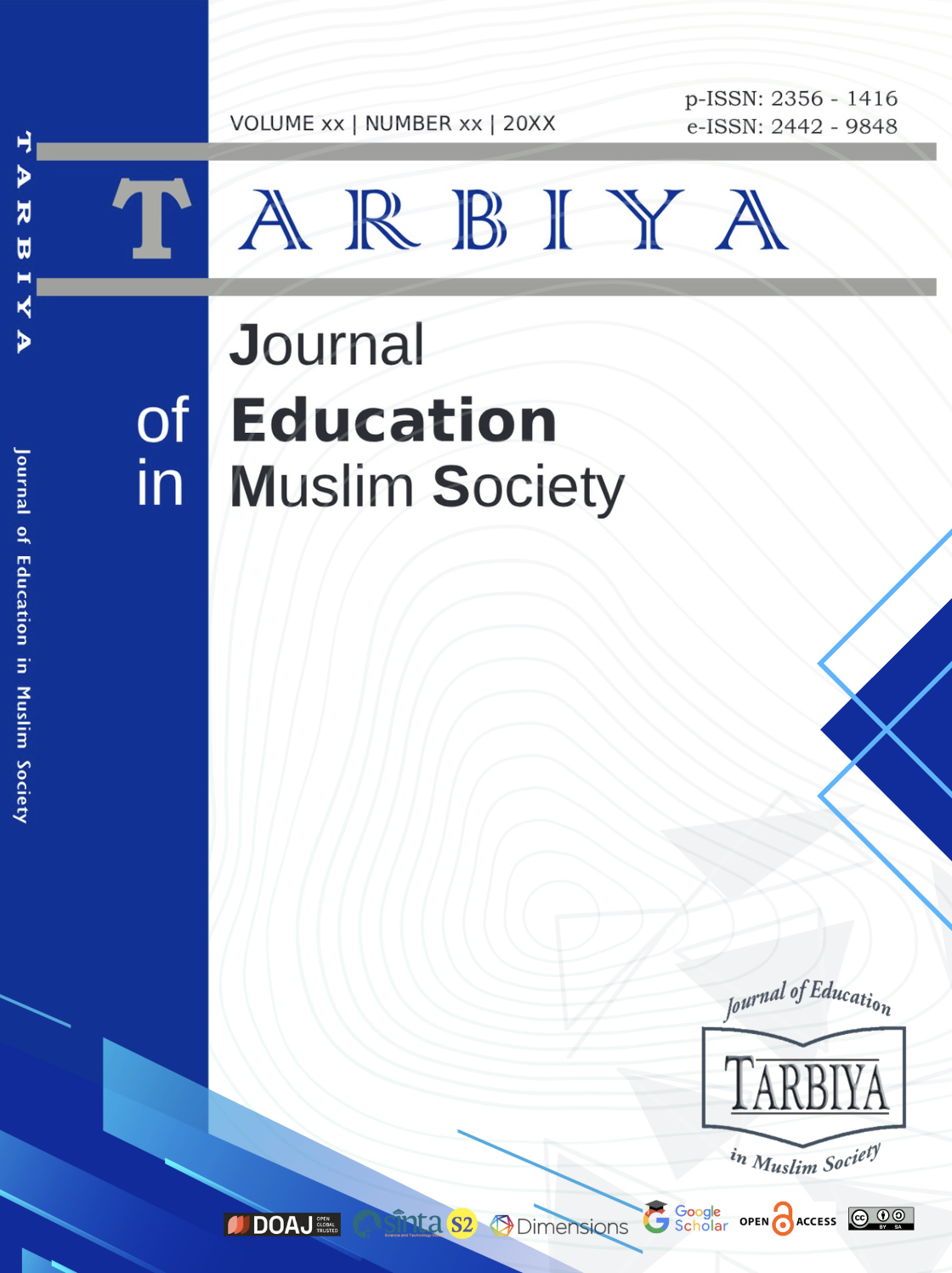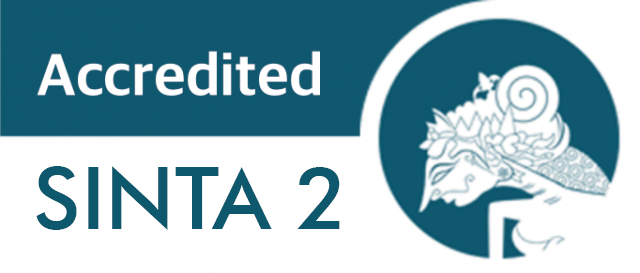Deep Learning Engagement as a Predictor of Academic Self-Efficacy and Language Performance
DOI:
https://doi.org/10.15408/tjems.v12i1.46710Keywords:
deep learning engagement, latent profile analysis, academic self-efficacy, self-regulated learning, keterlibatan pembelajaran mendalam, analisis profil laten, efikasi diri akademik, pembelajaran yang diatur sendiriAbstract
Abstract
This study investigates how deep learning engagement influences academic self-efficacy and language performance among English majors in Indonesia. Deep learning is an active and reflective process that involves critical thinking, conceptual integration, and self-regulated learning. Using a person-centred quantitative design, data were collected from 300 English majors across three universities and analysed through Latent Profile Analysis (LPA). This study applies LPA in English as Foreign Language (EFL) higher education and examines how learner diversity can be observed in a Muslim-majority population. The analysis identified three distinct learner profiles: reflective analysts, strategic learners, and passive processors. Reflective Analysts achieved the highest levels of academic self-efficacy and language performance, as measured by GPA in writing and speaking. In contrast, Passive Processors recorded the lowest scores. Profile membership was significantly influenced by academic year with clear developmental trend, whereas gender had no effect. Overall, the findings confirm that deep learning engagement is a strong predictor of EFL achievement. Theoretically, the study advances understanding of learner diversity of deep learning within Southeast Asian higher education. Practically, The study underscores the need for differentiated instruction (e.g., reflective writing and scaffolding) to help less engaged learners strengthen their critical reflection and self-regulation.
Abstrak
Penelitian ini bertujuan mengungkapkan bagaimana keterlibatan dalam pembelajaran mendalam memengaruhi efikasi diri akademik dan kinerja bahasa di kalangan mahasiswa jurusan Bahasa Inggris di Indonesia. Pembelajaran mendalam merupakan proses aktif dan reflektif yang melibatkan berpikir kritis, integrasi konseptual, dan pembelajaran yang diatur sendiri. Dengan menggunakan desain kuantitatif berpusat pada individu, data dikumpulkan dari 300 mahasiswa jurusan Bahasa Inggris di tiga universitas dan dianalisis melalui Latent Profile Analysis (LPA). Studi ini menerapkan LPA dalam konteks pendidikan tinggi Bahasa Inggris sebagai bahasa asing (EFL) dan menelaah bagaimana keragaman pembelajar dapat diamati pada populasi mayoritas Muslim. Analisis mengidentifikasi tiga profil pembelajar yang berbeda: reflective analysts, strategic learners, dan passive processors. Reflective Analysts mencapai tingkat efikasi diri akademik dan kinerja bahasa tertinggi, diukur berdasarkan IPK dalam keterampilan menulis dan berbicara. Sebaliknya, Passive Processors mencatat skor terendah. Keanggotaan profil dipengaruhi secara signifikan oleh tahun akademik dengan tren perkembangan yang jelas, sedangkan jenis kelamin tidak berpengaruh. Secara keseluruhan, temuan ini menegaskan bahwa keterlibatan dalam pembelajaran mendalam merupakan prediktor kuat terhadap pencapaian EFL. Secara teoretis, penelitian ini memperluas pemahaman tentang keragaman pembelajar dalam konteks pembelajaran mendalam di pendidikan tinggi Asia Tenggara. Secara praktis, penelitian ini menekankan perlunya pembelajaran berdiferensiasi (misalnya, penulisan reflektif dan scaffolding) untuk membantu pembelajar yang kurang terlibat dalam memperkuat refleksi kritis dan pengaturan diri mereka.
How to Cite: Istiara, F., Sutrisno, J., Tama, O. H., Mahrunnisya, D., Ajeng, G. D., Adijaya, N., Saputra, D. W., & Hadi, M. S. (2025). Deep Learning Engagement as a Predictor of Academic Self-Efficacy and Language Performance. TARBIYA: Journal of Education in Muslim Society, 12(1), 115-126. doi:10.15408/tjems.v12i1.46710.
References
Alrashidi, O., & Alshammari, S. H. (2025). The effects of self-efficacy, teacher support, and positive academic emotions on student engagement in online courses among EFL university students. Education and Information Technologies, 30(6), 8139–8157. https://doi.org/10.1007/S10639-024-13139-3
Antonietti, C., Consoli, T., Schmitz, M. L., Cattaneo, A., Gonon, P., & Petko, D. (2025). “Digital constructivists, activators or presenters? Different profiles of technology integration among swiss upper secondary school teachers.” Computers & Education, 227, 105225. https://doi.org/10.1016/J.COMPEDU.2024.105225
Benight, C. C., & Bandura, A. (2004). Social cognitive theory of posttraumatic recovery: the role of perceived self-efficacy. Behaviour Research and Therapy, 42(10), 1129–1148. https://doi.org/10.1016/J.BRAT.2003.08.008
Biggs, J. B. (1978). Individual and Group Differences in Study Processes. British Journal of Educational Psychology, 48(3), 266–279. https://doi.org/10.1111/J.2044-8279.1978.TB03013.X
Cai, Y., & Xing, K. (2025). Examining the mediation of engagement between self-efficacy and language achievement. Journal of Multilingual and Multicultural Development, 46(3), 893–905. https://doi.org/10.1080/01434632.2023.2217801
Cano, F., Pichardo, C., Justicia-Arráez, A., Romero-López, M., & Berbén, A. B. G. (2024). Identifying higher education students’ profiles of academic engagement and burnout and analysing their predictors and outcomes. European Journal of Psychology of Education, 39(4), 4181–4206. https://doi.org/10.1007/S10212-024-00857-Y
Dinh, C. T., & Phuong, H. Y. (2025). EFL student learning experiences in MOOCs: analysis through the lens of sociocultural theory and community of inquiry. Reflective Practice. https://doi.org/10.1080/14623943.2025.2494340
Entwistle, N. (2001). Styles of learning and approaches to studying in higher education. Kybernetes, 30(5–6), 593–603. https://doi.org/10.1108/03684920110391823
Feng, E., Zhao, X., & Wang, H. (2025). Chinese EFL learners’ basic psychological needs satisfaction and foreign language emotions: a person-centered approach. IRAL - International Review of Applied Linguistics in Language Teaching, 63(1), 735–758. https://doi.org/10.1515/IRAL-2023-0087
Gebauer, M. M., McElvany, N., Bos, W., Köller, O., & Schöber, C. (2020). Determinants of academic self-efficacy in different socialization contexts: investigating the relationship between students’ academic self-efficacy and its sources in different contexts. Social Psychology of Education, 23(2), 339–358. https://doi.org/10.1007/S11218-019-09535-0
Hong, W., Bernacki, M. L., & Perera, H. N. (2020). A latent profile analysis of undergraduates’ achievement motivations and metacognitive behaviors, and their relations to achievement in science. Journal of Educational Psychology, 112(7), 1409–1430. https://doi.org/10.1037/EDU0000445
Hosseinpour Kharrazi, F., & Ghanizadeh, A. (2024). The Interplay Among EFL Learners’ Academic Procrastination, Learning Approach, Burnout, and Language Achievement. Asia-Pacific Education Researcher, 33(5), 1213–1222. https://doi.org/10.1007/S40299-023-00791-5
Huda, M., & Lubis, A. H. (2019). Exploring the Implementation of Student-centered Learning in EFL Classrooms: Perspectives from Islamic Secondary-school Teachers in Indonesia. IJELTAL (Indonesian Journal of English Language Teaching and Applied Linguistics), 3(2), 187–201. https://doi.org/10.21093/IJELTAL.V3I2.147
Hwang, H. J., & Cabell, S. Q. (2021). Latent profiles of vocabulary and domain knowledge and their relation to listening comprehension in kindergarten. Journal of Research in Reading, 44(3), 636–653. https://doi.org/10.1111/1467-9817.12360
Jiang, L., Zhou, N., Gu, M. M., & Li, X. (2025). Exploring student motivation and engagement in EMI: a latent profile analysis. Language and Education, 39(1), 72–90. https://doi.org/10.1080/09500782.2024.2311146
Jiang, R. (2022). Understanding, Investigating, and promoting deep learning in language education: A survey on chinese college students’ deep learning in the online EFL teaching context. Frontiers in Psychology, 13, 955565. https://doi.org/10.3389/FPSYG.2022.955565
Jiao, Y., Bai, B., & Li, J. (2025). Profiling EFL Students’ Motivation and Anxiety in Collaborative Learning: Associations With Teachers’ Support, Self-Regulated Learning, and Achievement. International Journal of Applied Linguistics. https://doi.org/10.1111/IJAL.12831
Khong, M. L., & Tanner, J. A. (2024). Surface and deep learning: a blended learning approach in preclinical years of medical school. BMC Medical Education, 24(1), 1–12. https://doi.org/10.1186/S12909-024-05963-5
Korhonen, V., Aldahdouh, T., Holubek, V., Abou-dagga, S., & Al-Masri, N. (2024). Student engagement and concerns on studies and future professions: exploratory research in a Palestinian higher education context. International Journal of Educational Management, 39(3), 661–688. https://doi.org/10.1108/IJEM-03-2023-0132
Li, F., & Zhang, L. (2025). The application of deep learning in English culture and situational teaching. Journal of Computational Methods in Sciences and Engineering, 25(3), 2690–2702. https://doi.org/10.1177/14727978251321398
Li, L., Chen, S., Tang, P., Lv, K., Li, P., & Xu, Y. (2025). Unlocking Deep Learning: How Self-Regulated Learning Shapes Chinese Students’ Online Course Experiences. SAGE Open, 15(3). https://doi.org/10.1177/21582440251365390
Liu, M., & Oga-Baldwin, W. L. Q. (2022). Motivational profiles of learners of multiple foreign languages: A self-determination theory perspective. System, 106, 102762. https://doi.org/10.1016/J.SYSTEM.2022.102762
Liu, M., Zhang, L. J., & Neufeld, T. J. E. (2025). Chinese EFL learners’ GenAI literacy in digital multimodal composing and self-regulated writing: chain mediation effects of needs satisfaction and creative self-concept. Innovation in Language Learning and Teaching. https://doi.org/10.1080/17501229.2025.2549754
Muwonge, C. M., Ssenyonga, J., Kibedi, H., & Schiefele, U. (2020). Use of self-regulated learning strategies Among Teacher Education students: A latent profile analysis. Social Sciences & Humanities Open, 2(1), 100037. https://doi.org/10.1016/J.SSAHO.2020.100037
Rose, S. E., Taylor, L., & Jones, S. E. (2025). Perceptions of feedback and engagement with feedback among undergraduates: an educational identities approach. Assessment & Evaluation in Higher Education, 50(2), 266–278. https://doi.org/10.1080/02602938.2024.2390933
Ryan, R. M., & Deci, E. L. (2020). Intrinsic and extrinsic motivation from a self-determination theory perspective: Definitions, theory, practices, and future directions. Contemporary Educational Psychology, 61, 101860. https://doi.org/10.1016/J.CEDPSYCH.2020.101860
Sun, Q., Yang, Z., & Jiang, L. (2025). Effect of an EAP Course on Students’ Writing Performance, Anxiety and Self-Efficacy: A Latent Profile Analysis. Asia-Pacific Education Researcher, 34(3), 933–948. https://doi.org/10.1007/S40299-024-00909-3
Wang, Q., Gao, Y., & Wang, X. (2025). Exploring Engagement, Self-Efficacy, and Anxiety in Large Language Model EFL Learning: A Latent Profile Analysis of Chinese University Students. International Journal of Human–Computer Interaction, 41(12), 7815–7824. https://doi.org/10.1080/10447318.2024.2400403
Xu, J., & Corno, L. (2022). A person-centred approach to understanding self-regulation in homework using latent profile analysis. Educational Psychology, 42(6), 767–786. https://doi.org/10.1080/01443410.2022.2041556
Yang, Y., & Lay, Y. F. (2025). Academic buoyancy and learner interactions as mediators of deep learning in blended learning contexts: The role of teaching, social, and cognitive presence. Education and Information Technologies, 30(5), 6261–6286. https://doi.org/10.1007/S10639-024-13066-3/METRICS
Zare, J., Derakhshan, A., & Zhang, L. J. (2025). Investigating the relationship between metastrategy use and task engagement in an EFL context: a structural equation modeling approach. Innovation in Language Learning and Teaching, 19(2), 105–121. https://doi.org/10.1080/17501229.2024.2337710
Zhan, S., & Zhong, S. (2025). A latent profile analysis of future selves and grit among multilingual learners: Associations with language learning engagement. System, 129, 103590. https://doi.org/10.1016/J.SYSTEM.2024.103590
Downloads
Published
Issue
Section
License
Copyright (c) 2025 Febriyantina Istiara, Joko Sutrisno AB, Ozi hendra Tama, Dyanti Mahrunnisya, Galuh Dwi Ajeng, Nuryansyah Adijaya, Dendi Wijaya Saputra, Muhammad Sofian Hadi

This work is licensed under a Creative Commons Attribution-ShareAlike 4.0 International License.












